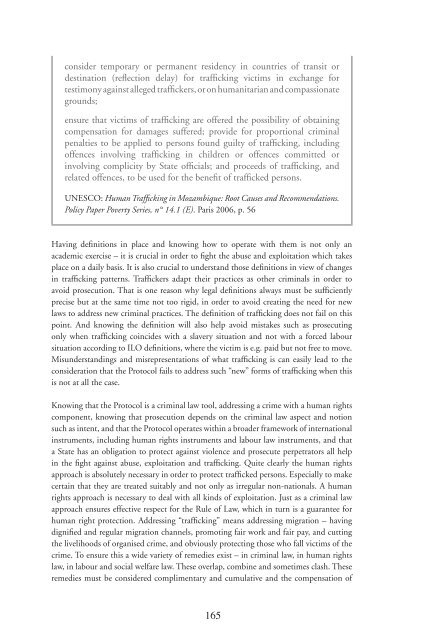Trafficking in human beings: human rights and ... - unesdoc - Unesco
Trafficking in human beings: human rights and ... - unesdoc - Unesco
Trafficking in human beings: human rights and ... - unesdoc - Unesco
Create successful ePaper yourself
Turn your PDF publications into a flip-book with our unique Google optimized e-Paper software.
consider temporary or permanent residency <strong>in</strong> countries of transit or<br />
dest<strong>in</strong>ation (refl ection delay) for traffi ck<strong>in</strong>g victims <strong>in</strong> exchange for<br />
testimony aga<strong>in</strong>st alleged traffi ckers, or on <strong>human</strong>itarian <strong>and</strong> compassionate<br />
grounds;<br />
ensure that victims of traffi ck<strong>in</strong>g are offered the possibility of obta<strong>in</strong><strong>in</strong>g<br />
compensation for damages suffered; provide for proportional crim<strong>in</strong>al<br />
penalties to be applied to persons found guilty of traffi ck<strong>in</strong>g, <strong>in</strong>clud<strong>in</strong>g<br />
offences <strong>in</strong>volv<strong>in</strong>g traffi ck<strong>in</strong>g <strong>in</strong> children or offences committed or<br />
<strong>in</strong>volv<strong>in</strong>g complicity by State offi cials; <strong>and</strong> proceeds of traffi ck<strong>in</strong>g, <strong>and</strong><br />
related offences, to be used for the benefi t of traffi cked persons.<br />
UNESCO: Human Traffi ck<strong>in</strong>g <strong>in</strong> Mozambique: Root Causes <strong>and</strong> Recommendations.<br />
Policy Paper Poverty Series, n° 14.1 (E). Paris 2006, p. 56<br />
Hav<strong>in</strong>g defi nitions <strong>in</strong> place <strong>and</strong> know<strong>in</strong>g how to operate with them is not only an<br />
academic exercise – it is crucial <strong>in</strong> order to fi ght the abuse <strong>and</strong> exploitation which takes<br />
place on a daily basis. It is also crucial to underst<strong>and</strong> those defi nitions <strong>in</strong> view of changes<br />
<strong>in</strong> traffi ck<strong>in</strong>g patterns. Traffi ckers adapt their practices as other crim<strong>in</strong>als <strong>in</strong> order to<br />
avoid prosecution. That is one reason why legal defi nitions always must be suffi ciently<br />
precise but at the same time not too rigid, <strong>in</strong> order to avoid creat<strong>in</strong>g the need for new<br />
laws to address new crim<strong>in</strong>al practices. The defi nition of traffi ck<strong>in</strong>g does not fail on this<br />
po<strong>in</strong>t. And know<strong>in</strong>g the defi nition will also help avoid mistakes such as prosecut<strong>in</strong>g<br />
only when traffi ck<strong>in</strong>g co<strong>in</strong>cides with a slavery situation <strong>and</strong> not with a forced labour<br />
situation accord<strong>in</strong>g to ILO defi nitions, where the victim is e.g. paid but not free to move.<br />
Misunderst<strong>and</strong><strong>in</strong>gs <strong>and</strong> misrepresentations of what traffi ck<strong>in</strong>g is can easily lead to the<br />
consideration that the Protocol fails to address such “new” forms of traffi ck<strong>in</strong>g when this<br />
is not at all the case.<br />
Know<strong>in</strong>g that the Protocol is a crim<strong>in</strong>al law tool, address<strong>in</strong>g a crime with a <strong>human</strong> <strong>rights</strong><br />
component, know<strong>in</strong>g that prosecution depends on the crim<strong>in</strong>al law aspect <strong>and</strong> notion<br />
such as <strong>in</strong>tent, <strong>and</strong> that the Protocol operates with<strong>in</strong> a broader framework of <strong>in</strong>ternational<br />
<strong>in</strong>struments, <strong>in</strong>clud<strong>in</strong>g <strong>human</strong> <strong>rights</strong> <strong>in</strong>struments <strong>and</strong> labour law <strong>in</strong>struments, <strong>and</strong> that<br />
a State has an obligation to protect aga<strong>in</strong>st violence <strong>and</strong> prosecute perpetrators all help<br />
<strong>in</strong> the fi ght aga<strong>in</strong>st abuse, exploitation <strong>and</strong> traffi ck<strong>in</strong>g. Quite clearly the <strong>human</strong> <strong>rights</strong><br />
approach is absolutely necessary <strong>in</strong> order to protect traffi cked persons. Especially to make<br />
certa<strong>in</strong> that they are treated suitably <strong>and</strong> not only as irregular non-nationals. A <strong>human</strong><br />
<strong>rights</strong> approach is necessary to deal with all k<strong>in</strong>ds of exploitation. Just as a crim<strong>in</strong>al law<br />
approach ensures effective respect for the Rule of Law, which <strong>in</strong> turn is a guarantee for<br />
<strong>human</strong> right protection. Address<strong>in</strong>g “traffi ck<strong>in</strong>g” means address<strong>in</strong>g migration – hav<strong>in</strong>g<br />
dignifi ed <strong>and</strong> regular migration channels, promot<strong>in</strong>g fair work <strong>and</strong> fair pay, <strong>and</strong> cutt<strong>in</strong>g<br />
the livelihoods of organised crime, <strong>and</strong> obviously protect<strong>in</strong>g those who fall victims of the<br />
crime. To ensure this a wide variety of remedies exist – <strong>in</strong> crim<strong>in</strong>al law, <strong>in</strong> <strong>human</strong> <strong>rights</strong><br />
law, <strong>in</strong> labour <strong>and</strong> social welfare law. These overlap, comb<strong>in</strong>e <strong>and</strong> sometimes clash. These<br />
remedies must be considered complimentary <strong>and</strong> cumulative <strong>and</strong> the compensation of<br />
165

















